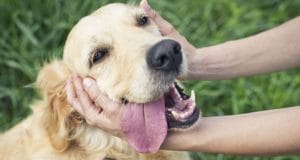If you were a fan of the television show “Friends,” then you probably remember one of the more famous moments from the series, which came almost twenty years ago at the end of season four. As the character of Ross is about to get married to his fiancée Emily, when he recites the vows, instead of her name he says, “Rachel.” This mix-up ends that marriage before it begins.
And if you grew up with siblings, you’ve probably experienced this phenomenon yourself when another family member tried to call one of you and wound up running through the entire list of names.
Now, if you’ve ever done it or had it done to you, has the family dog’s name come up in the list as well? Don’t be surprised — or offended — if it has, because it’s more common than you’d think. According to a study published in “Memory & Cognition,” the dog’s name comes up in this context much more often than the cat’s or those of other pets.
This misnaming using the dog’s name is also more likely to happen when someone runs through the whole list of family member’s names to get to the right one.
So, what’s going on here? It would make perfect sense to misname someone because of a resemblance to another person, and family members are more likely to resemble each other than unrelated individuals, but that only explains mixing up the human names. Although they say that humans and their dogs do begin to resemble each other, the transformation can’t really transcend the species difference that much.
Researchers now think that the reason dogs get included in the error comes from how we classify them in our minds, and they have something called “semantic similarity” to the people in our family. That is, our brains store the information about our relationship to the entity represented by the name the same way for our family members and our dogs. When we try to retrieve the identifying information, we pull the humans’ and dog’s names out of the same mental bucket.
What this means in plain English is that deep down in our brains where we process memory and language, we consider our dogs to be family members in exactly the same way we think of our siblings, parents, or other relatives in the household.
Of course, true dog lovers never needed scientists to tell them that. We’ve known all along that our dogs are, indeed, members of the family.











